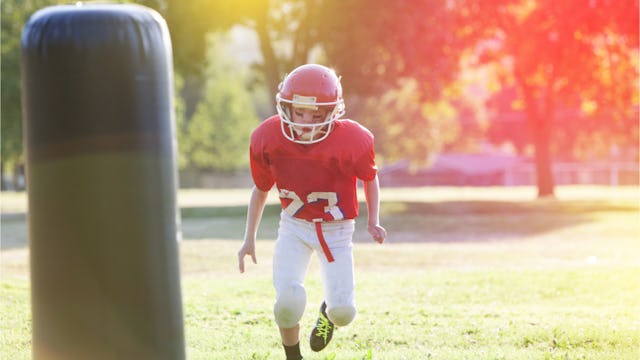Brett Favre Opened Up About Football And Head Injuries

Much of the conversation around football lately focuses on head injuries, and the high level of concussions that football players are exposed to. But the truth is, head injury risks go far beyond football.
I work on the academic end of a Division I sports department, and regardless of the sport, head injuries are common. Part of my job is to coordinate mandatory study hall and tutoring. If a student sustains a head injury, I receive a report. Depending on the time of the year and what sport is in season, I receive multiple reports from football, soccer, gymnastics, and wrestling. I even receive them from what would be considered low-impact sports, such as track and swimming. In fact, one of our pole vaulters is on her fourth concussion and was recently rendered medically retired. She’s 21 years old.
My son is 11, and he’s an avid soccer player, and I cannot help but think about all these reports and wonder when he will sustain his first concussion. I honestly don’t know what I will do if he decided to take up football. The fact is, head injuries are incredibly common in all sports, but the lion’s share I see come from football — and that should make any parent with a child considering playing the sport take a second thought.
And if you don’t want to take my word for it, listen to Brett Favre. The man is the picture of toughness. He started in 297 straight NFL games, won three consecutive AP MVP awards, played in two Super Bowls, and won Super Bowl XXXI.
Favre recently appeared on the TODAY Show to discuss his own struggles with head injuries. “I’ve talked to several doctors, asking them about symptoms, and one of them is not being able to finish a sentence,’’ Favre said in a TODAY exclusive. He discussed gaps in his memory, particularly short-term memory.
“I think to me the wake-up call was [wife] Deanna and I were talking recently, and she was talking about Breleigh, our youngest, playing soccer. I’ve pretty much made every game that she’s ever played (in) basketball, volleyball. She played softball one year; she played basketball a couple years. As I find out, she played soccer. I don’t remember her playing soccer… that was probably my first inclination that something ain’t right.”
As a father trying to hang on to every moment with my children, I can appreciate just how concerning missing whole chunks of a child’s life would be. And sure, some of you reading this might be thinking that this might just be a sign of old age. I mean, honestly, I’m 35 and I can’t find my keys most mornings. But when you consider that Farve is only 48, it seems strange that he would be missing whole chunks of his life and commenting on daily issues with his own memory.
The part of his interview that really made me pause as a father, however, was when he said he’d push his own children away from playing football. Favre doesn’t have a son, but if he did, he told TODAY, “I would be real leery of him playing” football and said that most of this has to do with the potential for head injuries.
The reality is, everything he’s saying is all part of a larger medical discussion about head injuries in sports, particularly football. And the fact is your child doesn’t even have to sustain a concussion to experience long-term brain damage. A new study published in Translational Psychiatry is looking at what happens before the concussion. Doctors at Boston University took a look at what happens early on when a child begins to play tackle football before the age of 12. What they found is worrisome to anyone with a young child interested in, or already playing, the game.
Researchers took a sampling of 214 former American football players. These men played at all different levels. Some only played as children while others only played in high school. Several played in college and even at the professional level. The average age was 51. Doctors and researchers conducted telephone interviews and sent out questioners, and didn’t look at CT scans. They simply wanted to know about behavior.
What they found was that men who began playing tackle football before the age of 12 had three times the odds of suffering from clinical depression, and two times the chance of suffering from clinical apathy and behavioral deregulation. Many also struggled with executive function and impulse control.
Here’s the thing — because there’s always a thing — playing sports can and will take a toll a person’s body regardless of the sport. I have the knees of 50-year-old from snowboarding in my teens. That’s the fact. But football can also cause long-term damage to the brain that no one, not even Brett Farve can walk off. As parents, we have to ask ourselves if we want to accept that risk. We also need to discuss the risks with our children, so that they understand it. And above all, we need to take a look at the way we practice and participate in sports, particularly football, to make sure that head injuries are minimized as much as possible.
There are a lot of good things that can come from participating in sports. Working in a collegiate athletics program, I can say without a shadow of a doubt that some of the most driven students I’ve ever worked with have been student-athletes. But ultimately, we need to try and minimize the risk, and do everything we can to make sure our short-term goal of sports glory doesn’t cause a long term and damaging ailment.